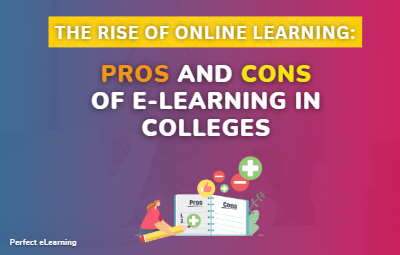

Online learning has become increasingly popular in recent years, with many colleges and universities offering online courses and degree programs. The convenience and flexibility of e-learning have made it an attractive option for students who want to balance their studies with other commitments.
However, the rise of e-learning has also raised questions about its effectiveness compared to traditional classroom-based learning. In this article, we will explore the pros and cons of e-learning in colleges and help you decide if it is the right choice for you.
Pros of E-Learning in Colleges
Flexibility and Convenience
One of the most significant benefits of e-learning is its flexibility and convenience. Students can access course materials and lectures at their convenience, allowing them to study at their own pace and schedule. This is especially beneficial for students who work part-time or have other commitments.
Personalized Learning Experience
E-learning platforms offer a personalized learning experience that is tailored to each student's needs and abilities. This allows students to focus on their strengths and weaknesses, and to work at their own pace.
Cost-effective
E-learning is often less expensive than traditional classroom-based learning. Students save money on transportation, housing, and other expenses associated with attending a physical campus.
Access to a Wide Range of Courses
E-learning offers students access to a wider range of courses than traditional classroom-based learning. Students can take courses from institutions all over the world, without the need to relocate or commute.
Interactive Learning Environment
E-learning platforms offer an interactive learning environment that engages students in the learning process. Online discussions, quizzes, and interactive exercises help students stay engaged and motivated.
Cons of E-Learning in Colleges
Lack of Social Interaction
One of the biggest drawbacks of e-learning is the lack of social interaction. Students miss out on the opportunity to network and build relationships with peers and instructors.
Technical Issues and Digital Divide
E-learning requires access to a computer and a reliable internet connection. Students who do not have access to these resources may struggle to participate in online courses, creating a digital divide.
Requires Self-Discipline and Motivation
E-learning requires a high level of self-discipline and motivation. Without the structure and routine of a traditional classroom, students must be self-motivated and organized to succeed.
Limited Hands-on Learning Opportunities
E-learning is often limited in its ability to provide hands-on learning opportunities. Courses that require laboratory work or physical interaction may not be as effective online as they are in a traditional classroom.
Questionable Credibility of Online Degrees
The credibility of online degrees is still a concern for many employers and industries. Some employers view online degrees as less credible than traditional degrees, which could affect a student's job prospects.
Conclusion
E-learning has become a popular alternative to traditional classroom-based learning, offering students greater flexibility, convenience, and access to a wider range of courses. However, it
However, it also comes with some drawbacks such as limited social interaction, technical issues, and questionable credibility of online degrees. It is important for students to weigh the pros and cons before deciding if e-learning is the right choice for them.
Frequently asked Questions (FAQs)
Q- Is e-learning as effective as traditional classroom-based learning?
While e-learning offers many benefits, some studies suggest that traditional classroom-based learning may be more effective in certain subjects and for certain students. However, the effectiveness of e-learning varies depending on the course, institution, and individual student.
Q- How can students overcome the lack of social interaction in e-learning?
Students can overcome the lack of social interaction in e-learning by participating in online discussions, joining virtual study groups, and attending online events hosted by their institution.
Q- Can online degrees be trusted by employers?
The credibility of online degrees varies depending on the employer and industry. While some employers may view online degrees as less credible than traditional degrees, others may value the flexibility and self-discipline required to complete an online degree program.
Q- How can students stay motivated in e-learning?
Students can stay motivated in e-learning by setting clear goals, creating a schedule, and staying engaged in the learning process through interactive exercises, quizzes, and discussions.
Q- What are some of the technical requirements for e-learning?
To participate in e-learning, students need access to a reliable computer and internet connection, as well as the necessary software and hardware required by their institution's e-learning platform.


